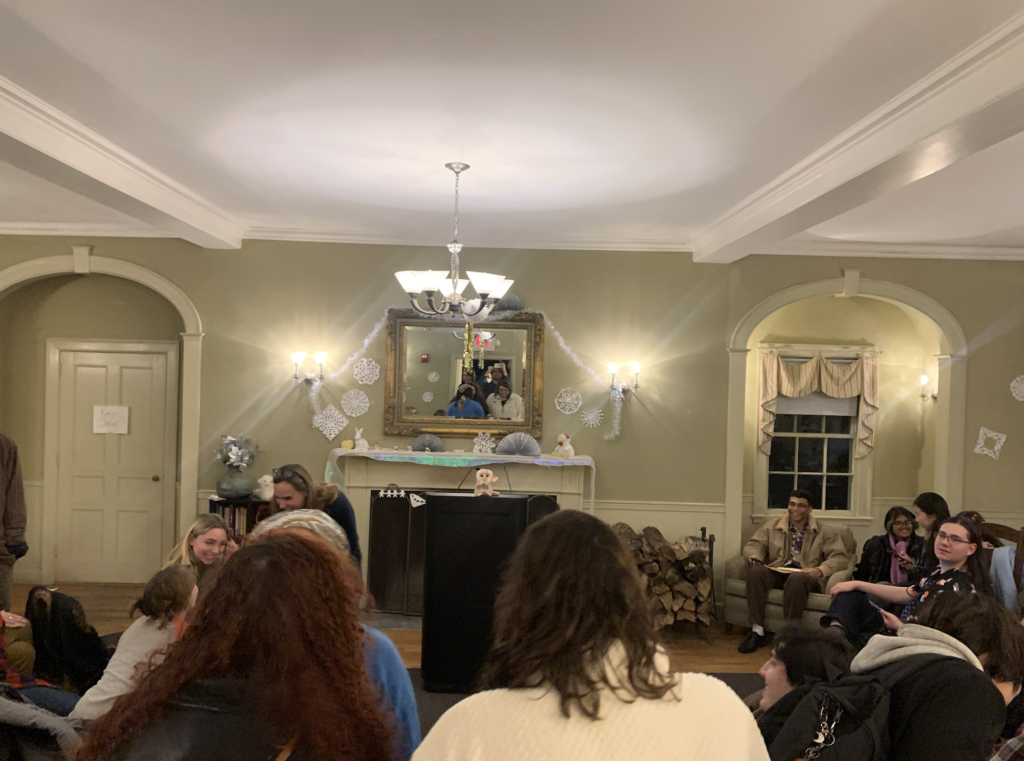
On the night of Friday, December 1st, Bennington students crowded the Franklin common room to listen to a 6×6 poetry reading with six students from Bennington and six from Williams College. The chairs across the room were all full and students sat along the back and front rows in clusters, focused on the podium where each reader approached with a printout of their poems, taking a breath before facing the crowd and introducing their poems.
First to read was Williams student Juliet Berton, who read two poems, including “Theorem of Gaza.” These poems focused on assonance and the dichotomy between oblivion and abundance, as in one line, “The body is full and empty all at once.” With imagery of the Brooklyn Bridge, Coney Island, and other locations in New York City, the scenes were washed in dark, muted colors to match the melancholic tone.
Bennington student Carrie Colley read next, including the poems “Intimacy with Flowers,” “Worship,” “After Maurice Manning’s Bucolics,” “Negligence/Desertion,” and “I Don’t Know the Time” and “Romantic Fervor.” A memorable image from “Negligence / Desertion” is “an old, rough baby doll with its eyes out of whack” which the speaker’s father uses to make a scarecrow, then“he posted a picture of the two on facebook and asked which one was scarier: the old or the new.”
The next reader was Williams student Ranu Gunawardena, who read four poems, including my favorite, “Rituals of August.”
Lukas Fletcher, Bennington student, read “Guardrail,” “An Extra Hour Together on the Mass Pike,” and “Marathon.” My favorite of these poems, which I really enjoyed during our class workshop, is “An Extra Hour Together,” and the lines: “On the way back from Provincetown // I was saltcrusted and close mouthed and / I steered the car and I hated you for it or / I wanted to be the thing that pulled // with equal force on either side of you / and made you be in two places / at once.” The poem ends: “That night // I had to feed the dogs, / which is to say that at my feet / two dogs sat hungry, // or rather that a dog will wag its tail / for a long time before learning / it won’t be fed.”
Williams student Maya Jacobs read “Grammar of Ornament,” “General Thoughts,” “October,” “Pushback,” and “Here’s a Love Poem to the Orange Tree.” A lasting image from “General Thoughts” is “cities rising from the ground like a scar.” I asked Maya how she chose what to read. “Some are from a class from sophomore year that were edited and workshopped,” she said. “Other poems were newer and I wasn’t sure how they would be received so I wanted to experience that.”
Edison Hicks, a Bennington student, read their poem “Break Down.” I remember workshopping this poem, and the class loved the comedic interjections and punchlines alongside the introspective, sorrowful reflections on the speaker and their family. The poem begins: “Poetry and comedy are built / On the same principles: / Commitment to the bit, / The need for impeccable / Timing, and an opening anyone can / Despise.” My favorite of the punchlines in a series of riffs goes, “Sub / Merged like Amelia Earhart’s plane / In the ocean or her body on the sand / Eaten by coconut crabs? Tropical Reference!” I asked Edison about what it was like to read. “I’ve done readings this term so it wasn’t very scary. It was exciting to be there with people who haven’t heard my poetry yet,” they told me.
Williams student Abby Murphy read “Nikki Haley Would Survive Jurassic Park,” “Octobers,” “Sister Swimming,” and “Embrace.” I loved “Nikki Haley Would Survive Jurassic Park,” which begins humorously and evolves to be a serious, inward-looking study at sisterhood. My favorite line: “I did not mean to be a little girl when my sister grew up.”
Bennington student Blu read “Cain,” “Mount St. Helen’s,” and “Jonah in Sudan.” My favorite of these is “Mount St. Helen’s,” which we workshopped in class recently, and is told from the perspective of Harry R. Truman, the man who refused to leave Mount St. Helen’s when it was erupting and had the entire town pleading for him to come down to safety. The poem is a beautiful entry into what he may have been thinking in these crucial moments. I love the final lines: “What is there to do but pack the desperate letters down the kitchen drain. / Schoolchildren beg in dim green crayon. Please come down. Harry—we love you. / Something about last chances. I send ash. Then there is no breath at all.” After the reading, I asked Blu what their experience was like reading. They said, “It was nerve wracking but I had a great time. Overall it was a great reading and experience!”
Ethan Richmond, Williams senior, read a golden shovel poem, where the last word of every line is a different word from a quote. This poem used a quote from Giovanni’s room and is called “A Story.” Ethan also read “Strike.” We talked after the reading about both working on senior theses, and I asked him what it was centered around. “I write a lot after literature and I like relating my work to other work that has come before me,” he said, and added that the Bennington reading was special because of how cozy the space is.
Isabel Ruppel, Bennington student, read “Fetch,” “We Go On For Far Too Long,” “Cut,” and an excerpt from a longer poem, “My Roommate and I Survive the Time of Monsters.” My favorite lines from “We Go On For Too Long” are: “The ant may wish to be close to the boot. It does not know a thing about love. // A fish does not know what it takes to make the fly. / It believes itself to be in control of all the violence. // All of this violence will seem so forgivable in a year’s time.”
The final reader from Williams, Tiffany Wu, read “The Bounty,” “Regulation,” and “My Mother Calls Me A White Feminist Without Calling Me A White Feminist.” After she finished reading, the room was applauding for several minutes and the people beside me and I all turned to each other to say how incredible it was. “Regulation” was about the illegal ban of bubblegum in Singapore, with my favorite line: “we step on the ants just to leave something small and dead / behind us.” I loved “My Mother Calls Me A White Feminist,” and each line was like a gasp in its striking language and metaphors. The speaker, the mother of a daughter who is studying at a university in America, tells her daughter that she did not send her abroad to return home thinking of “every woman gutting a fish at a kitchen sink or to see in every woman a gutted fish in a kitchen sink.” This poem was gorgeous and I’m still thinking about it days later. I told Tiffany how much I loved her poems, and asked her why she chose to read these poems tonight. She laughed, telling me that “I haven’t written much lately, so I chose poems I wrote a long time ago that my friends liked.”
The final reader of the night was Finn Wilkinson, Bennington Student, who read “Open Casket Elergy,” “La Tendresse,” and “Sour Grapes.” I loved these poems as well, which discussed sickness and love and the self.
This was a wonderful, crowded, collective experience. The words remain in my mind like a stamp for weeks after, and I return to not only the eloquence and impressive poetic techniques of the poets, but the excitement and pride for their work clearly portrayed in their reading of the poems.
I also spoke with Michael Dumanis after the event about how this collaboration began. “I started the two collaborations, with Sarah Lawrence and Williams, during my first year at Bennington in spring 2013. Jeffrey McDaniel from Sarah Lawrence and I decided to start the program. We did a workshop together with students from both colleges. For a couple years we went there and here, then we started doing the readings with Williams.” The program stalled for a bit during Covid, but returned last year, with this year being the third collaboration with Williams. “We bring students to Sarah Lawrence in the spring,” Michael continued. “It’s one of the most innovative things we do that doesn’t exist anywhere else. It’s an exchanging of shared experiences of workshops and poetry styles. I learn so much from hearing student writers who are not my students. Tonight was one of my favorite readings.”
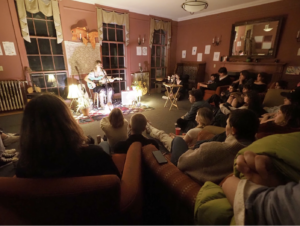

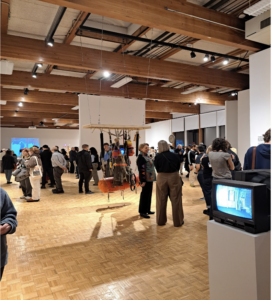
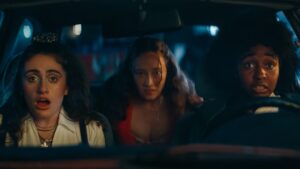
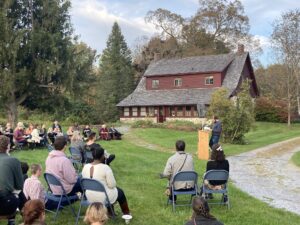


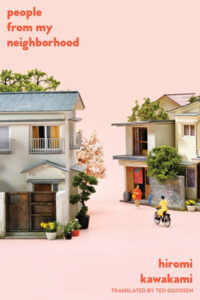
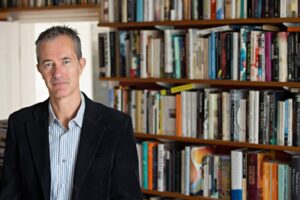
Be First to Comment